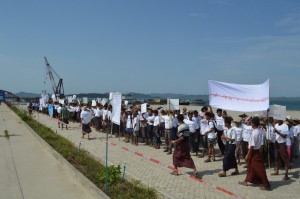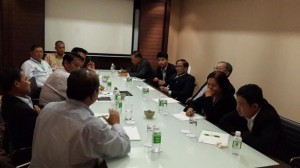Campaign Updates (695 found)
A Dangerous Precedent for Development in Burma
 On 30 September, Shwe Gas Movement released a new report entitled, “Drawing The Line: The Case Against China’s Shwe Gas Project, For better Extractive Industries in Burma”. The report highlights the consequences, violations, unequal development, inadequate laws and the dangerous precedent set by the Shwe Gas Project. With increased investment and the liberalization of Burma’s economy, development projects similar to Shwe Gas are set to increase. If they follow a path of code and conduct similar to the Shwe Gas Project, the future of Burma will be rife with increased land confiscation, labor abuse, environmental degradation, loss of livelihoods, conflict, arrests and imprisonment of rights activists defending themselves and their communities. The benefits will be unequally distributed and negative consequences will be borne by farmers, fishermen, and by the citizens of Burma.
On 30 September, Shwe Gas Movement released a new report entitled, “Drawing The Line: The Case Against China’s Shwe Gas Project, For better Extractive Industries in Burma”. The report highlights the consequences, violations, unequal development, inadequate laws and the dangerous precedent set by the Shwe Gas Project. With increased investment and the liberalization of Burma’s economy, development projects similar to Shwe Gas are set to increase. If they follow a path of code and conduct similar to the Shwe Gas Project, the future of Burma will be rife with increased land confiscation, labor abuse, environmental degradation, loss of livelihoods, conflict, arrests and imprisonment of rights activists defending themselves and their communities. The benefits will be unequally distributed and negative consequences will be borne by farmers, fishermen, and by the citizens of Burma.
The Shwe Gas Project is the largest extractive resource project in Burma with dual gas and oil pipelines traveling almost 800km beginning in Arakan State, passing through Magway and Mandalay Regions, exiting Burma through northern Shan State and terminating in Kunming, China. The now operational project provides China with a valuable energy transportation system and is expected to earn US$54 billion for the Burma government, a government that was given the lowest resource governance ranking in the world three months ago by the Revenue Watch Institute […]
New Report: Shwe Gas Project Sets Dangerous Precedent
A new report released by Shwe Gas Movement calls for suspension of the Shwe Gas Project on the grounds that it sets a dangerous precedent for the extractive industries and leads to ongoing human rights abuses that include land confiscation, poor labor practices, environmental damage and exacerbation of tensions with ethnic nationalities […]
• • •Myanmar National Human Rights Commission Issues News Release on Complaints
1. The Myanmar National Human Rights Commission was constituted with the aim of raising and protecting the fundamental rights of citizens in accord with the Constitution of the Republic of the Union of Myanmar and its office is kept open at No. 27 on Pyay Road in Hline Township of Yangon […]
• • •Tavoyan Women Expose Abuses Linked to Dawei Deep Sea Port, Call for Project to be Suspended
A new video launched today by the Tavoyan Women’s Union (TWU) exposes how the Thai and Burmese developers of the Dawei deep sea port project are abusing local villagers’ rights. They are calling for an immediate suspension of the project.
The 15- minute video shows how the pristine beauty of the Tavoyan coast is being ravaged and the cultural heritage of the Tavoyan people being threatened by the port and industrial zone […]
• • •New Film Calls for Political Dialogue for Lasting Peace in Burma’s Kachin State
To coincide with the International Day of Peace, Burma Partnership launched a new documentary film today entitled, “Guns, Briefcases and Inequality: The Neglected War in Kachin State.” The film demonstrates the need for the government of Burma to engage in meaningful political dialogue with all ethnic nationalities on equal terms, including discussing amendments to the 2008 Constitution. These are necessary in order to address the underlying causes of armed conflict: self-determination, the lack of ethnic rights, and inequality, and to move towards lasting peace throughout the country […]
• • •Your Stories Are Ours
Today, in commemoration of the International Day of Peace, we, members of the Global Partnership for the Prevention of Armed Conflict in Southeast Asia (GPPAC-SEA) express our solidarity to all the peace-loving peoples of the region particularly in Myanmar/Burma.
We come from Aceh, Indonesia, Malaysia, Mindanao, Thailand and the Philippines and together with our partners in Myanmar visited Kachin State this week to see, listen and feel for ourselves– however briefly– the situation there following the collapse of a 17-year ceasefire between the Myanmar government and the Kachin Independence Organization (KIO) two years ago […]
• • •Letter to President Obama on GSP Trade Benefits for Burma
Dear President Obama,
We are writing about the ongoing review to reinstate trade benefits for Burma under the Generalized System of Preferences (GSP). Promoting trade with Burma creates human rights risks, particularly in problem sectors such as extractive industries and plantation agriculture, that could undermine the careful economic reengagement policy your Administration has charted thus far. Therefore, if GSP benefits are restored to Burma, we urge your Administration to take the steps outlined in this letter to manage the human rights impacts of that decision […]
• •Rice Rations Being Changed for Refugees from Burma/Myanmar in November
After November, rice rations will be needs-based and community-managed in refugee camps in Thailand
Rice rations are being revised in refugee camps in Thailand following reductions in funding for humanitarian food aid and a transition to needs-based and community-managed humanitarian relief. These changes are being introduced by The Border Consortium (TBC), which provides humanitarian relief and development assistance to refugees and conflict-affected people from Burma/Myanmar […]
• • •The Future Must be Federalism in Burma
 Preliminary peace talks between the alliance of ethnic non-state armed groups, the United Nationalities Federal Council (UNFC) and the Burma government in Chiang Mai, Thailand, over the weekend of 8-9 September resulted in little progress. Meanwhile the Burma Army is simultaneously reinforcing and strengthening its positions in Kachin State, resulting in more armed clashes and causing fear of another major offensive.
Preliminary peace talks between the alliance of ethnic non-state armed groups, the United Nationalities Federal Council (UNFC) and the Burma government in Chiang Mai, Thailand, over the weekend of 8-9 September resulted in little progress. Meanwhile the Burma Army is simultaneously reinforcing and strengthening its positions in Kachin State, resulting in more armed clashes and causing fear of another major offensive.
Led by Minister Aung Min, the Union Peace Working Committee invited the UNFC to Naypyidaw to sign a nationwide ceasefire accord despite there being no ceasefire agreement with the Kachin Independence Organization (KIO), a member of the UNFC. Given the increasing attacks on the Kachin and little tangible progress made in the peace process so far, the UNFC did not immediately accept the offer. The nationwide ceasefire accord signing is a major part of the government’s peace strategy and their plan is for international observers to be present, as well as domestic and international media. For the government, this very public show is important may be important to show the world that progress is being made, their peace plan is working and that perhaps more importantly, Burma is open for business […]
Shans fear repatriation to Burma
The weather is often misty and cold in the mountainous jungle surrounding Koung Jor, the Shan refugee camp located a stone’s throw from the Burmese border in Thailand’s Wiang Haeng district.
Koung Jor means “happy hill”, and dozens of Shan families were smiling widely last Sunday morning when a donation of mosquito nets arrived from the International Office for Migration.
“Their happiness at receiving new mosquito nets will soon disappear if you start asking them how they feel about repatriation. They will panic,” said 33-year old Sai Kyaw, who has been volunteering for nearly 10 years on an education program for children at the camp […]
• •








 All posts
All posts